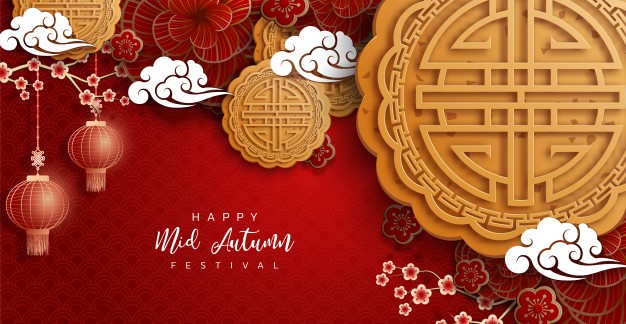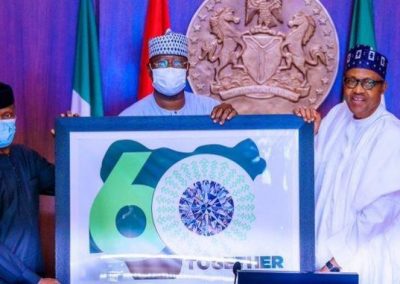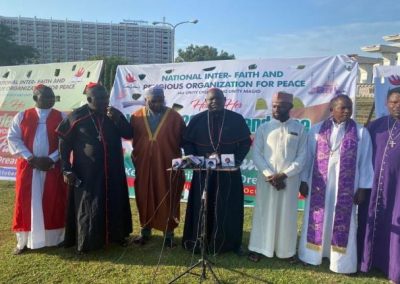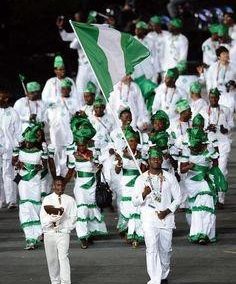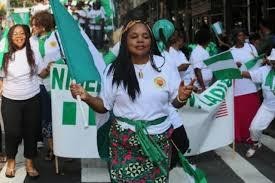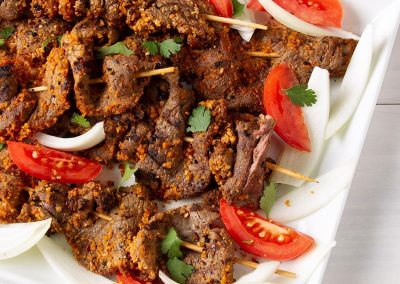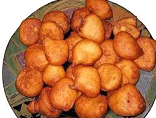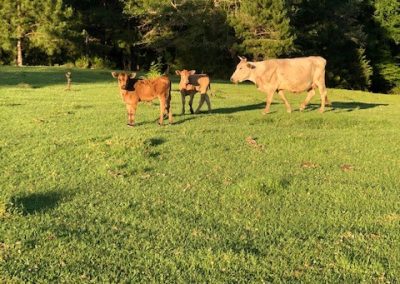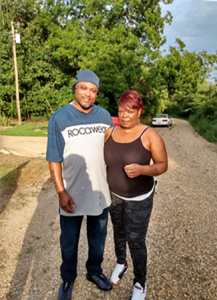Global Diversity Awareness Project
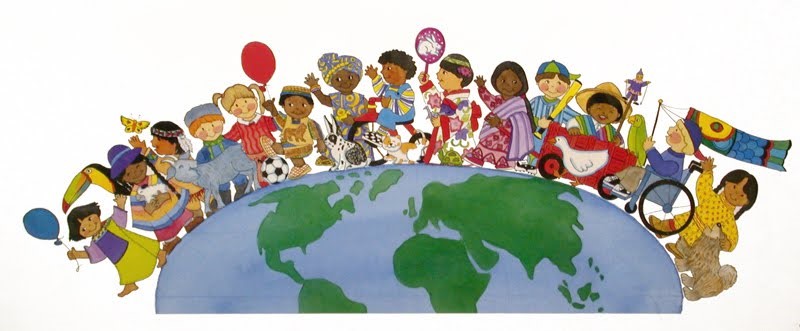
Let’s celebrate global diversity awareness and pay tribute to the diverse minds and beliefs held by all cultures around the world. We live in a multicultural society and embracing the values of various cultures only strengthens our understanding and appreciation of the world.
Open your mind to new views and ideas, appreciate cultural differences, and enjoy a fresh perspective you may have been missing. It helps you become a true citizen of the world.
You don’t have to travel the world to learn about another culture. Just take notice of the people in your workplace, in your neighborhood, the places you shop or frequently visit, etc. Different cultures are all around us.
This project is hosted by Fannie Lou Hamer Library.
All images shown are the property of their respective owners.
Enjoy these diversity stories from JHLS staff and other submitters below. Click on a name to view the story.
If you have a global diversity story that you would like for us to add, please email your submission to hamer@jhlibrary.org.
Miao Jin, Director of Technical Services, JHLS Administration
Mid-Autumn festival was October 1st this year. It is one of the most important holidays for Chinese. We eat moon-cakes on this day. Here is a website about this holiday:
https://www.chinahighlights.com/festivals/mooncake.htm
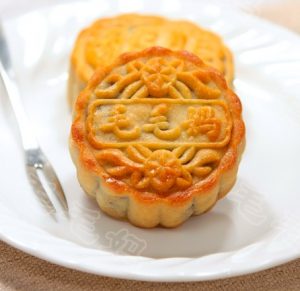 It is not easy to make moon-cakes. I never tried it. We always buy it from Mr. Chen’s grocery store in Jackson. I think it is too many steps. I am planning to make moon- cakes after I retire.
It is not easy to make moon-cakes. I never tried it. We always buy it from Mr. Chen’s grocery store in Jackson. I think it is too many steps. I am planning to make moon- cakes after I retire.
Here is a recipe that I will use if I make it myself. I read it many times but never tried it.
Cassandra Cooper, Branch Manager of the Ella Bess Austin Library of Terry
I grew up in “sweet home Chicago” and spent my summers in “my mouth so dry I feel like I’m spittin cotton” Mississippi. The latter was dehydration but, I always associated it with those hot sweaty days and nights in rural Mississippi. I spent my younger years on the culturally diverse North side of Chicago amidst multi-ethnic streets with friends and classmates of Italian, Black, Greek, Italian, Puerto Rican, Gypsy, Colombian, Mexican, Apache, Polish, Yugoslavian, French descent. It was eating Mexican, Chinese, Italian foods on Friday and Saturdays cause my mother refused to cook or ethnic food from street festivals. However, Sundays were reserved for traditional soul food with all relatives and friends usually from Mississippi stopping by. In Chicago, we played in front of the steps of rundown brown-stone houses in endless games of double-dutch, Irish jump rope, and Chinese jump rope and hopscotch. It’s my mama walking us to the beach and the zoo or riding the El and bus over to backyard/house card games and parties with my mom’s brothers and endless cousins.
During the summer we would go down to the Delta to Granddaddy’s sharecropping farm and once old enough sent out to the field to chop cotton or pick peas. I’m still amazed how people could tell time by looking up at the sky. I still hate the smell of outhouses however, priming a pump for water and drinking it straight from the pump…priceless. Down in the “country” we played endless running games, bogie man, hide and go seek, cowboys and Indians, always baseball, and endless chores. It was around eleven getting up at zero dark thirty and going to the fields dressed in long sleeve shirts and pants scarves and hats looking no different than old time field slaves. It’s waking up to the rooster cry and the smell of coffee and it’s Grandmama’s fried chicken and biscuits.
It was the days of throwing peace signs and raised fists for soul signs and yelling out “Say it Loud I’m Black and I’m Proud” as we road on the back of Grandaddy’s truck and people whether white or black they would throw the signs back at us and smile. My grandfather kept us pretty isolated and when we went places it was to other relatives or his moonshine customer’s homes only. I heard … but I did not know my uncles were getting in trouble with him for being involved with Fannie Lou Hamer’s “always keeping up trouble” rabble rousing and gon get you all killed’ voting rights movement. The Church we went to was even one of the sanctuaries for Freedom Riders but, again I heard about that afterwards. I just know my aunt started wearing an afro and refused to let me read anything but Black authors. It truly was “the best of times, it was the worst of times.
Patrick McCarty, Branch Manager of the Bolden/Moore Library
I grew up in southeast Louisiana about thirty miles outside of Baton Rouge and seventy miles outside of New Orleans and was always aware of the cultural and ethnic diversity of my native region. Livingston Parish has one of the largest rural Hungarian populations in the United States, as a matter of fact, I had an uncle whose parents immigrated from Hungary, then part of the Austro-Hungarian Empire, around the turn of the last century. My uncle lived to be over one hundred years of age and was a wealth of knowledge and source of inspiration. The southern region of Livingston Parish contains a substantial Acadian or Cajun population, which is heavily prevalent in the southwestern and southeastern regions of the Bayou State. The French influence in Louisiana is well documented and widely discussed but the Spanish influence is perhaps not as well known. Spanish architecture, cuisine, surnames and overall influence can be found in places like New Orleans and New Iberia, LA and even in Jazz Music, New Orleans Jazz pianist Jelly Roll Morton often commented on “the Spanish Tinge” ingredient in Jazz. Neighboring Tangipahoa Parish, it’s located directly to the east of my native Livingston Parish, has a large Italian population, especially in the city of Independence but also elsewhere in the parish.
The Irish influence is one which happens to be very near and dear to my heart. I worked for the Irish Cultural Museum of New Orleans for over a year and came away with a new found appreciation and respect for the kind of influence and impact the sons and daughters of Eire had on Louisiana generally and New Orleans specifically. The St. Patrick’s Day Parade in New Orleans is one of the largest and most fervently celebrated in the country. The Irish Channel was a major Irish and German Catholic enclave in New Orleans for many decades. Speaking of New Orleans, the Big Easy contains a diverse array of ethnic and racial groups. New Orleans has sizable Irish, Italian, German, French, Jewish, Croatian, Caribbean, African American, Creole and even Vietnamese populations and that’s just to name a few. There’s also a very interesting group of Louisianians whose ancestors immigrated from the Canary Islands in the latter part of the 19th century. This group are known as the Islenos and are very prominent in St. Bernard Parish, which is adjacent to Orleans Parish.
On a personal note, one of my dearest friends growing up had Native American ancestry and I happen to come from a large family of different cultural and ethnic stripes and strands. I have family members who are of Irish, French, Lowland Scots, Highland Scots, Scots-Irish, English, Welsh, Croatian, German, Jewish, Hungarian, Honduran, Asian Indian and Greek descent. I have cousins who are bi and multiracial. I’ve a dear aunt who’s from Greece and always providing me with plenty of instruction as it pertains to her country’s history and culture. Louisiana, indeed America, is an ideal example of the melting pot concept working in full force and in very successful fashion. This obviously brings to mind the larger context of all of us belonging to the human race. Our society would be abundantly better off if we were more often reminded of this reality.
Ruth Jinkiri, Autism Resource Center Coordinator, Eudora Welty Library
Nigeria
An independence celebration in any country is always a joyful, colorful time with clothing, food, parades and speeches.
October 1, 2020 was Nigeria’s 60th independence celebration. These are some pictures from the internet that gave a little glance of this year’s celebration.
The People
The Food
Laura Jane Glascoff, Tech Education Officer, Eudora Welty Library
This is a family story that has been passed down for many years. There are elements that are 100% true and can be backed up with paperwork. There are other elements that I suspect have been slightly embellished over the years. The facts might even be embellished by me as I write them down for you now.
Near the turn of the last century my great grandmother boarded a ship in Ireland to come to the United States. She was the third daughter in a large family who set sail for adventure and opportunity in Boston, Massachusetts. While on the ship she heard stories about what to expect when she got there. The other women told her that there were only a few types of “good jobs” available to unmarried women without their own money when they arrived in Boston.
Finding a job as a maid was easy and didn’t require any experience. Some businesses needed a person to come in and clean on a regular basis. Also there were rich families that not only hired maids, some even had quarters for them! However the women all agreed that being a maid did not pay well, particularly considering the amount of work involved, and there was no guarantee of the working conditions. Still it was honest work that was readily available all around Boston and they told her where to look.
The women on the ship said that getting a job as a nanny paid quite a bit better, but was much harder to find. Many nanny jobs were live in and if the family was rich the living space was nice. They shared stories about how being a nanny for a rich kid can be an opportunity to see all kinds of things—as long as you didn’t mind wiping their snotty noses! The women on the ship told her that if she wanted to be a nanny, she should assure the families that she’d be with them for many years, to see the “wee babies” grow to be adults.
All of the women agreed that the best job was as a cook but it was the most difficult job to get. They talked about how much power a cook has in a household. How a cook gets to make decisions, not only about what the family eats, but when and how well. A good cook could even negotiate better pay lest she be snapped up by some other family. That’s why it was such a hard job to find, not as many families hired cooks as hired nannies or maids and the ones that did rarely let them go. Being a cook could be the best job, but was nearly impossible to get.
When my great grandmother arrived, she followed the advice of the women she met on the ship and looked for a job. She did not want to be a nanny—she could have stayed at home in Ireland if she wanted to wipe the noses of other people’s children! She walked up to a gentleman who looked like he was looking to hire someone to work in his house and said, “Hello sir, are you looking for a maid?” and to her surprise he said, “Actually, I’m looking for a cook! Do you know anyone who might be interested?” She did not know what to do, she had heard that this sort of opportunity never came along. She immediately said, “I’m a cook! You should hire me!” And he did.
It was a lovely opportunity but there was one major problem, she did not in fact know how to cook. She was the third daughter, and her mother and sisters had always done the cooking! Luckily, she knew how to read. With her last pennies she bought a copy of The Boston Cooking-School Cook Book also known as the Fannie Farmer Cookbook. She read the book cover to cover, and followed the recipes exactly as they were written. No one was the wiser! She stayed on with the family as a cook for several years until she married my great grandfather. Her own children were raised with the importance of reading and following directions and those values were passed on through the generations.
Alfenette Robinson, Branch Manager at Annie Thompson Jeffers Library of Bolton
A Small-Town Country Girl
I grew up in a community called Mt. Olive in Bolton, MS. My family consisted of my mom, dad, brother, and my twin sister. We grew vegetables, picked cotton and pecans, and assisted other farmers for extra money. With the extra money we earned, we went to the fair and saved for Christmas. My dad worked for the city of Jackson, and my mom stayed home while we were small. When we grew older, my mom accepted a job as a head-start teacher and housekeeper. My parents would take us to see our grandparents, aunts, uncles, and our great-grandparents. My great-grandparents constantly gave us treats such as tea cakes, candy and jelly.
My father worked for the local funeral home part-time (on Saturdays), and he would take us into the city with him. At that time, we would walk the streets of Bolton eating ice cream and snowballs. Anyone who grew-up in the country can tell you that a trip to town was a BIG deal! We would look into cafes and see the people dancing, drinking, and eating buffalo fish. I played softball for the best team in Hinds County. We played against other counties in Mississippi in the VA ball field in Jackson. For vacations we visited our aunts and uncles who migrated to the north to Maywood, IL for better job opportunities.
Even though I grew up in the country, I was afraid of cows and ants. Moreover, I wanted to join the army, but my dad forbad me to. He said he didn’t want his baby to do it. My mom gave my twin sister and me a birthday party for our sixteenth birthday under the carport with chips and tuna sandwiches. We invited a few boys to attend the party, and we played music. Additionally, when we were growing up, we would go to Mrs. Pearl’s store and buy slow pokes, apple stix, paydays, and longboys. We would also purchase hog-head souse, cinnamon rolls, and a coke that my mother would divide between me and my two siblings. She would pour peanuts in a RC cola and make it fizz up. We would walk barefoot for a half mile to and from the store. The dirt was hot, but we enjoyed ourselves. Those were the good ole days!
Before I became a librarian, I spent sixteen years working with special needs children and adults. Precious souls whom I will forever treasure in my heart.
There’s nothing like growing up in a small town where no one is a stranger. Thank God for Bolton, Mississippi, small town USA. I’ve been truly blessed.
Andy Bounds, Professional Assistant at Eudora Welty Library
For Global Diversity Awareness I want to focus on the role of minorities and women in the US Armed Forces. Women and minorities have proudly served in the US military since the Revolutionary War (1775-1783) and up through the present (Operation Enduring Freedom which has been ongoing since October 2001). However, for much of our country’s history the roles played by women and minorities has been overlooked.
I remember back on January 20, 1997 that before President Clinton was sworn in to begin his second term, there was a prayer breakfast at the White House in which Clinton presented Medals of Honor to surviving family members of both African-American World War I and II service members as well as to those World War II service members who were still living at the time. There are so few World War II and Korean War veterans who are still living and even fewer who are able to share their stories. There are Vietnam veterans who also served in World War II and/or Korea who are no longer able to share their stories as well. Speaking of African-American Korean War veterans, I heard one who said, “We all – black and white – bled the same blood!”
-

I posted this photo because while the US military was formally desegregated in 1948, the Korean War (1950-53) saw some of the last all-African-American units serve in combat as well as in support roles. More information at https://www.army.mil/article/51859/pentagon_honors_african_americans_in_korean_war
-
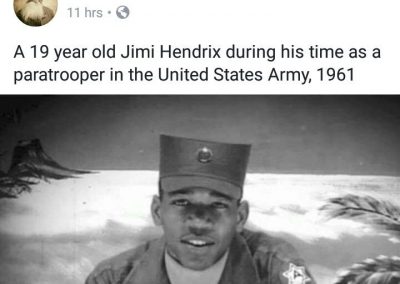
A 19-year-old Jimi Hendrix during his time as a paratrooper in the United States Army.
-
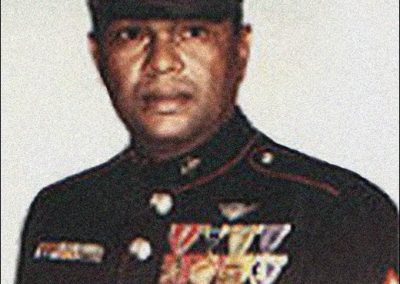
Sergeant Major Frederick Douglass, USMC. Served 1954-1983. End of watch - October 1983 as a result of the Marine Barracks Bombing in Beirut, Lebanon.
-
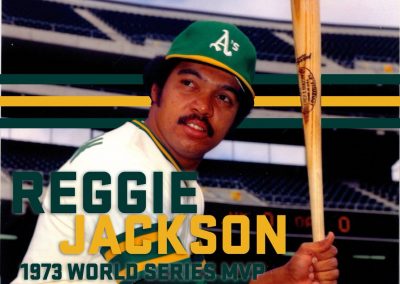
Reggie Jackson (#9) - 1973 American League and World Series MVP. The father of his Mexican American ex-wife, Jennie Campos, was killed in the Korean War.
-
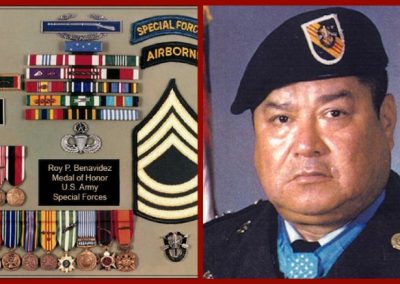
Master Sergeant Roy Benavidez, US Army Special Forces. Medal of Honor recipient.
-
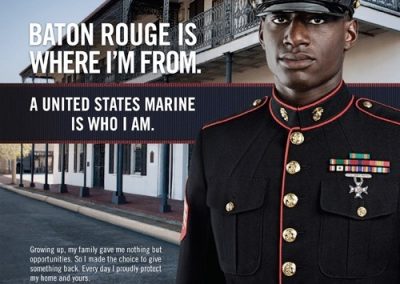
-
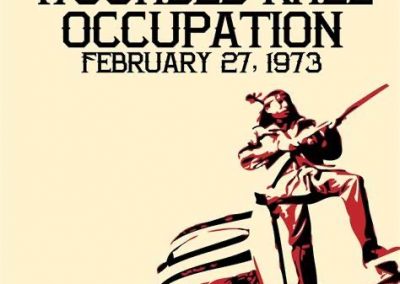
-
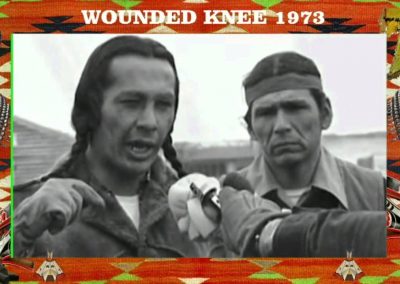
-
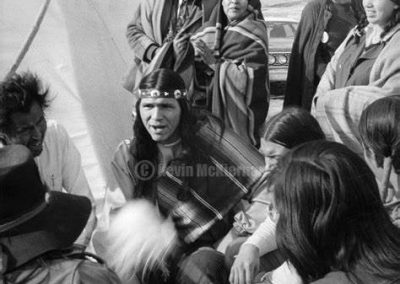
-
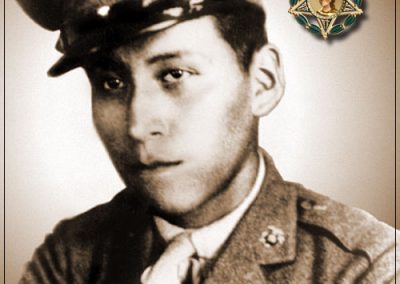
-
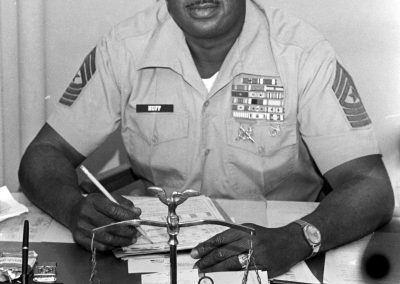
Sergeant Major Edgar Huff, USMC. One of the first Montfort Point Marines in World War II.
-
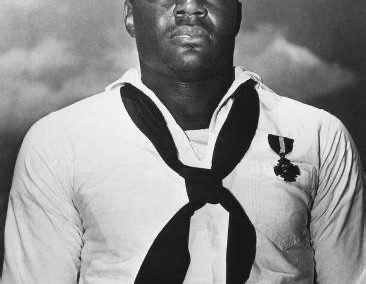
Seaman Apprentice Doris Miller, USN. First African-American to be awarded the Navy Cross for heroism at Pearl Harbor (7 December 1941).
-
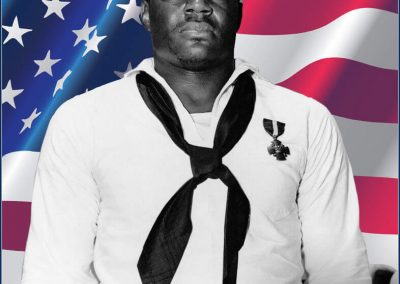
Seaman Apprentice Doris Miller, USN. First African-American to be awarded the Navy Cross for heroism at Pearl Harbor (7 December 1941).
-
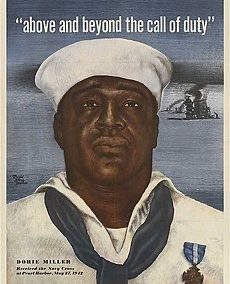
Seaman Apprentice Doris Miller, USN. First African-American to be awarded the Navy Cross for heroism at Pearl Harbor (7 December 1941).
-

Military Women's Memorial
Bibiana Walker, Circulation Assistant at Fannie Lou Hamer Library
I’M JUST A COUNTRY GIRL
I grew up in a town called Collinston. My hometown is located in northeast Louisiana. If you were to ask anyone if they were familiar with this town you would probably get a blank stare for an answer. While growing up, my siblings and I played in the cotton fields, we baked dirt cakes, and we played street games such as “hop scotch.” In the country you see several types of animals, and people would use them for amusement. For example, people would ride the horses and go to rodeos, but I was only a spectator. I was so afraid of them you wouldn’t catch me near them.
Crime wasn’t an issue for us because everybody knew their neighbor and kept a close watch on his or her surroundings. My grandparents owned several pieces of land, and they would host parties on the vacant lots. We would have live DJs and everyone in the neighborhood was invited. My grandmother would cook large dinners on Sundays. One of her specialties was gumbo. She made it from scratch.
When I was a teenager, I met a gentleman named Nathan Walker. Ironically, we had the same last name. He was a little older than I was, but we started a platonic relationship. We would take long walks holding hands and enjoying the country evenings. Nathan would walk, or even ride his bike, for about five miles to see me daily. We grew close, but it all came to an end quickly. My mother and father separated, so we moved in with our father in another city. I lost touch with Nathan. After ten years, we saw each other only to lose touch for another ten years.
I was scrolling through Facebook one day, and he was listed as a friend suggestion. I reached out to him, and that was the beginning of rekindling our relationship. After some time, we decided that I would go on the road with him. His occupation as a truck driver allowed me to travel to states I had never been. We moved in together, and we have been married now for four years. I have tried to move to the city on several occasions, but I always seem to land back in the country. I wouldn’t have it any other way. Before the virus, we would go home for family gatherings. Our families would cook big meals, and we would just have a good time.
We moved back home in 2018, but there were not enough resources for me. I wanted more as far as job opportunities. We were deciding where we would move to that would allow me to have those opportunities and not be far away from home. We agreed upon Jackson. We stayed in a hotel for about four months when we moved here just to see if we would want to stay. I was homesick at first, but Mississippi began to grow on me. We found a home, and then all other things began to fall into place. Fast forward almost two years. I am now working with a wonderful group of people, and I am still in the south.
